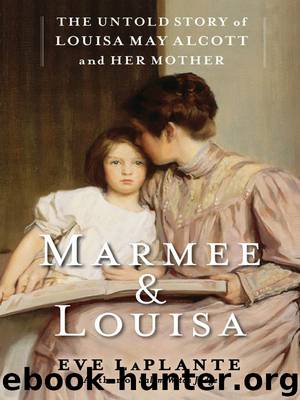Marmee & Louisa by Eve LaPlante

Author:Eve LaPlante
Language: eng
Format: epub
Publisher: Free Press
Chapter Thirteen
The Bitter Drop in This Cup
I never began the year in a stranger place than this,” Louisa scribbled on the first page of her new journal on January 1, 1863.979 “Five hundred miles from home, alone among strangers, doing painful duties all day long, & leading a life of constant excitement in this greathouse surrounded by 3 or 4 hundred men in all stages of suffering, disease & death.” She was in an army hospital in Washington, D.C., the capital of the nation and the Union war effort, where she was responsible for a forty-bed ward. Louisa had to “cork up” her feelings to avoid crying as she washed, fed, and consoled scores of injured and dying men. She had hardly a moment to stop and record her impressions. But this was something worth describing. “I . . . began my new life by seeing a poor man dying at dawn, and sitting all day between a boy with pneumonia and a man shot through the lungs. . . . [W]hen I put mother’s little black shawl round the boy while he sat up panting for breath, he smiled and said, ‘You are real motherly, ma’am.’ I felt as if I was getting on. The man only lay and stared with his big black eyes, and made me very nervous. . . . I sat looking at the twenty strong faces as they looked back at me,—hoping that I looked ‘motherly’ to them, for my thirty years made me feel old, and the suffering round me made me long to comfort every one.”
She had received her orders from Washington only a few weeks earlier. In haste she had filled a trunk with clothes marked “Louisa Alcott” in indelible ink by Sophia Hawthorne and Abigail, who though she supported her daughter’s decision confessed to her neighbor, “I shall feel helpless without Louisa.”980 She bid all a tearful good-bye and headed to Boston, escorted by Julian Hawthorne, Sophia and Nathaniel’s sixteen-year-old son, and her sister May. After having a cavity filled and securing nursing credentials, Louisa purchased tickets for her trip: by train to New London, Connecticut; by steamship to Jersey City, New Jersey; by train to Washington, D.C.; and by cab to the filthy, disheveled former hotel in which she now lived and worked on the main road in Georgetown, which she called “this big bee hive” or “Hurly-Burly House.”981 Her superior, Hannah Ropes of Boston, “cheered at the arrival of Miss Alcott of Concord—the prospect of a really good nurse, a gentlewoman who can do more than merely keep the patients from falling out of bed.”982
On December 16, 1862, Louisa’s first full day as a nurse, cart after cart of “legless, armless or desperately wounded” soldiers had arrived from Fredericksburg, Virginia. They were victims of a Union defeat in which nearly thirteen thousand men died. “In they came, some on stretchers, some in men’s arms, some feebly,” Louisa reported. “I drowned my scruples in my washbowl.” Like many Americans,
Download
This site does not store any files on its server. We only index and link to content provided by other sites. Please contact the content providers to delete copyright contents if any and email us, we'll remove relevant links or contents immediately.
| Crime & Criminals | LGBT |
| Special Needs | Women |
We're Going to Need More Wine by Gabrielle Union(19046)
Pimp by Iceberg Slim(14508)
Bombshells: Glamour Girls of a Lifetime by Sullivan Steve(14077)
The Radium Girls by Kate Moore(12030)
Becoming by Michelle Obama(10028)
Educated by Tara Westover(8054)
The Girl Without a Voice by Casey Watson(7889)
Wiseguy by Nicholas Pileggi(5787)
Hitman by Howie Carr(5097)
The Wind in My Hair by Masih Alinejad(5095)
The Rules Do Not Apply by Ariel Levy(4970)
Hunger by Roxane Gay(4928)
On the Front Line with the Women Who Fight Back by Stacey Dooley(4873)
Year of Yes by Shonda Rhimes(4758)
The Borden Murders by Sarah Miller(4325)
Papillon (English) by Henri Charrière(4274)
Joan of Arc by Mary Gordon(4115)
American Kingpin by Nick Bilton(3888)
Patti Smith by Just Kids(3778)
